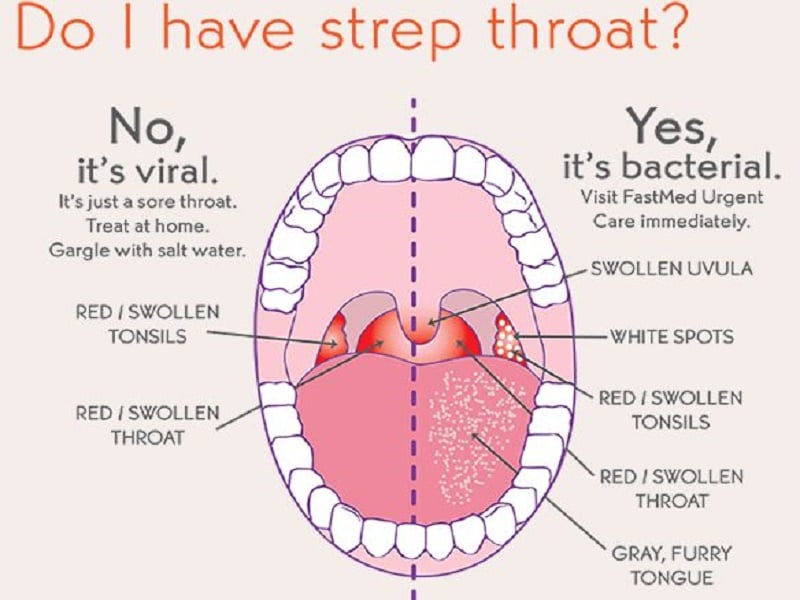What is strep throat? symptoms, causes, treatments, diagnose, prevent
Things to know about strep throat symptoms
Strep throat is a common disease recently. Therefore, the post will provide necessary information about the disease for all readers.
-
What is strep throat?
The streptococcal throat is a painful throat condition caused by Streptococcus bacteria. Strep throat symptoms are usually more severe than viral infections. Therefore, if the patient do not treat promptly, the disease will cause complications such as nephritis or rheumatic fever.
-
Who usually suffer from strep throat?
Everyone can have strep throat. However, the most common age ranges for children aged 5 to 15 years. You can reduce the chance of getting the disease by limiting the risk factors. You should consult your doctor for more information.
-
Strep throat symptoms
After streptococcus infection, it can take 2 to 5 days to develop symptoms. There are some possible strep throat symptoms include
– A sore throat or difficulty swallowing
– Fever above 38 ° C
– A headache
– Rash
– Stomach pain
– Not eating well, nausea
– Muscle pain and stiffness
– Swollen glands and white patches in the throat or small red spots may appear on the palate.
– Lymph nodes are swollen and painful in the neck
However, not everyone who has a streptococcus infection has a sore throat. In other words, you can carry the bacteria and be able to pass it on to others without the disease. There may be other symptoms not mentioned. If you have any questions about the signs of the disease, you should consult your doctor.
-
Time for see a doctor?
You should call your doctor or go to the hospital if you have one of the following symptoms
– A sore throat with swollen lymph glands
– A sore throat longer than 48 hours;
– A sore throat with a fever over 38oC in older children or fever for more than 48 hours;
– A sore throat with rash;
– Difficulty breathing or difficulty swallowing, including swallowing;
– Fever with joint pain, shortness of breath, and rash;
– Your urine is darker than one week after a sore throat. This is a severe complication because the kidneys are swollen due to streptococcus bacteria.
-
The causes of strep throat
Bacteria called Streptococcus pyogenes, or Group A streptococci are the main causes of strep throat. This disease is highly contagious and is mainly spread in the following forms
– Inhalation: Inhalation of airborne particles in the air when an infected person coughs or sneezes.
– Eat with the sick person.
– Contact with items such as door handles or other surfaces that are contaminated with bacteria.
-
Risks of the disease
Many factors can increase your risk of strep throat
– Age: 5 to 15 years old.
– The time is late in the spring and crowded places.
– Poor immune system
Having no risk factors does not mean you can not get sick. The above signs are for reference only. You should consult a specialist for more information.
-
Treatments
Your doctor will prescribe antibiotics like Penicillin to reduce the time you get sick. If the child is sick, the doctor will give the child amoxicillin solution because it is easier to drink. If you are allergic to penicillin, you may be prescribed antibiotics like cephalosporin (cephalexin) or the macrolide (erythromycin or azithromycin).
Paracetamol-containing medications can be used to relieve a sore throat and fever. You should not take aspirin at your own risk because you may be at risk of developing Reye syndrome. Rest and drink plenty of water especially warm water and lemon juice eat soft foods, rinse your mouth with warm salt water and avoid irritants such as cigarette smoke can help you feel better.
-
How to diagnose strep throat
Your doctor will diagnose strep throat based on symptoms or a physical examination. Besides, the doctor will also diagnose the disease based on the following methods
– Take samples from the throat to determine if the presence of pathogenic bacteria.
– Antigen test: You will have to follow this method as the result of the translation of the sample does not meet the doctor’s requirements.
-
How to prevent strep throat
You can control your condition well if you note several things below
– Regular hand washing is the best way to limit the spread of disease;
– Drink plenty of antibiotics as directed by your doctor;
– Avoid contact with strep throat.
– Do not share personal items with other people such as cups or etc.
– Eat soft foods like soups, cereals, mashed potatoes, and yogurt. Cold foods such as sherbet or frozen yogurt are also considered as soft foods;
– Do not give children and teenagers to drink. Children may have dangerous Reye syndrome;
– Do not sneeze or cough if you are sick. Cover your mouth and teach your child to cover his / her mouth when coughing or sneezing
– Do not eat spicy foods.
Hope that the post brings useful and necessary information about strep throat, if you have any questions or suggestions, you should consult your doctor or health professional for the best answer.
See more:
1- What is lactose intolerance? symptoms, cause, treatment, how to prevent
2- What is Gout? causes, symptoms, diagnosing, treatment, how to prevent Gout
3- What is a sinus infection? symptoms, cause, treat, prevent the sinus infection
4- What is chronic fatigue syndrome? Symptoms, causes, risks, treatment, prevent
5- What is irritable bowel syndrome (IBS)? Causes, Treatments
6- What is Lyme disease? Symptoms – Diagnosis – Treatment – Prevent
7- What is pelvic inflammatory disease (PID)? Causes – Signs – How to treat – How to prevent
8- What is polycystic ovary syndrome (PCOS)? Signs – The main cause – Treat
9- What is diabetes? Types – Symptoms – Complications of diabetes

